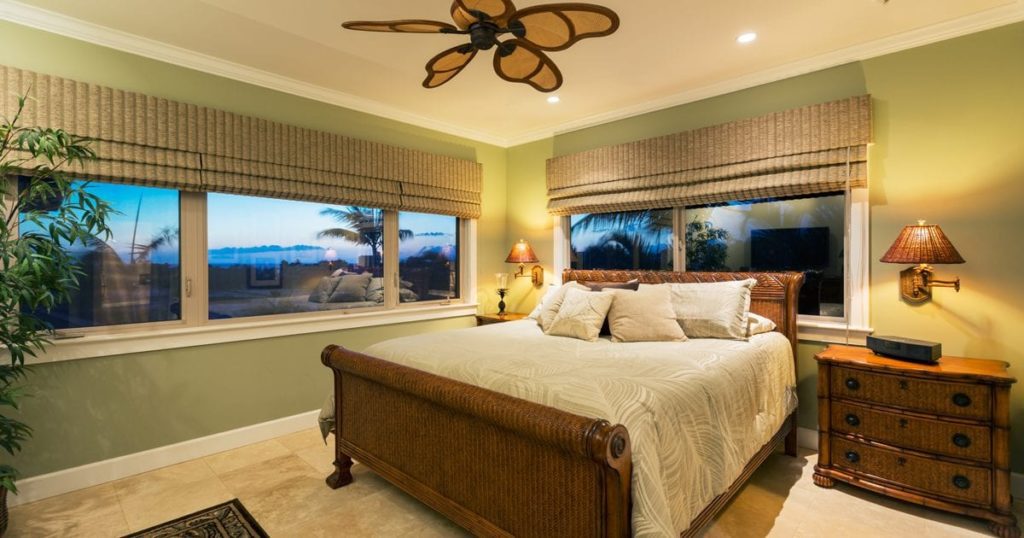Creating the ideal bedroom environment for sleep can significantly impact sleep quality. The first steps to optimizing your bedroom include reducing lights and sounds that make it harder to fall asleep. Other changes, like adjusting a bedroom’s temperature and humidity may be less obvious, but are equally important.
Humidity is the amount of water vapor in the air. There are two important terms to know when considering humidity: absolute humidity and relative humidity. Absolute humidity is the actual amount of moisture in the air, while relative humidity is the amount of moisture in the air relative to how much moisture the air can hold at the current temperature. The absolute humidity determines how humid a space feels, and has a greater impact on sleep as a result.
Tips for Humidity and Sleep

- 1 Maintain a humidity level between 30% and 50%.
- 2 Add moisture to a space by turning down the thermostat and using a humidifier.
- 3 Open windows, air conditioners, and dehumidifiers can help dry the air if humidity is high.
- 4 Bedding that absorbs moisture can help keep you comfortable.
Monitor humidity levels in your bedroom to ensure you always get a comfortable night of sleep.
How Humidity Affects Sleep
Indoor humidity that is either too high or too low can negatively affect sleep. Air that is too dry may make it harder to breathe at night, contributing to respiratory infections and irritating airways in the nose and throat. People often notice that being in a space with “dry air” irritates their eyes and breathing. Low humidity can dry out the skin, while also prompting it to create more oil to compensate for the dryness.
On the other hand, air that is too moist can make it harder to fall or stay asleep, and affect the time spent in certain sleep stages. High humidity is associated with increased nighttime sweating. Because mold and dust mites thrive in humid environments, these nighttime allergens are more common in bedrooms with more moisture. As a result, sleepers may experience increased allergy or asthma symptoms.
Ideal Humidity for Sleep
While the ideal bedroom humidity can differ based on climate and temperature, research suggests that the best relative humidity for sleeping is between 40% and 60%. This range is also helpful for reducing indoor pollutants that can interfere with sleep. The Environmental Protection Agency recommends protecting air quality by keeping indoor humidity between 30% and 50%.
Shop the Best Cooling MattressesOptimizing Bedroom Humidity
Maintaining appropriate humidity levels in a bedroom is important, and you may be wondering how to measure and adjust the humidity in your space. Many modern thermostats measure both the temperature and humidity in a home, so checking your thermostat is the best place to start. If that’s not the case in your home, indoor humidity monitors are inexpensive and can be found at most hardware stores.
Dry air is common in winter, as well as in drier climates like those of the American Southwest. Increasing humidity in overly dry bedroom environments can help reduce skin and airway irritation. Here are a few tips for increasing the humidity in your bedroom:
- Try a humidifier: Humidifiers are a common way to add moisture to a space. While this may be the right solution for you, it’s important not to overuse these helpful devices. Moisture can quickly accumulate in a small room and lead to other issues, like increasing mold and allergens.
- Turn down the heat: Indoor heating can cause moisture in the air to evaporate, quickly causing a room to dry out. Turning down the thermostat a few degrees may help maintain higher moisture levels.
- Add some plants: Plants increase humidity in a room on their own, but you can maximize the benefit by regularly misting plants with water. Another strategy is to place a tray underneath plants and fill it with pebbles and about a half-inch of water.
For people losing sleep due to high indoor humidity, it can be helpful to first identify the source of excess moisture. While the climate may cause high indoor humidity, sometimes excess moisture is a sign that it’s time for home repairs. Fixing leaks, ventilating crawl spaces, and replacing old bathroom exhaust fans can make a noticeable difference in older homes. The following tips may also be helpful in reducing moisture in your bedroom environment:
- Open a few windows: Moisture can accumulate in a home from everyday activities, including showers and cooking. If the outdoor humidity is low, consider regularly opening windows to allow moisture to escape from your space.
- Use a dehumidifier: Dehumidifiers are an important part of any strategy to decrease indoor humidity. These devices work by moving humid air through coils that collect condensation and remove moisture before releasing drier air back into a room.
- Consider air conditioning: Depending on the type of air conditioning unit used in a home, turning on the AC may decrease indoor humidity. While many people think that air conditioners simply blow cold air into a space, the reality is that many units work like dehumidifiers by cooling and removing moisture from indoor air.
- Find the right bedding: Some fabrics keep you cooler and drier than others. When sleeping in humid environments, it can be helpful to change out synthetic bedding for fabrics that are better at absorbing or wicking moisture. Breathable fibers, like cotton and rayon, can help you stay cooler. Those who tend to sleep hot may also want to consider a cooling mattress.
Fixing humidity that is too high or too low can take some experimenting with different methods, but finding the right setting can lead to better quality sleep.
References
Ask the Sleep Doctor
Have questions about sleep? Submit them here! We use your questions to help us decide topics for future articles, videos, and newsletters. We try to answer as many questions as possible. You can also send us an email. Please note, we cannot provide specific medical advice, and always recommend you contact your doctor for any medical matters.







